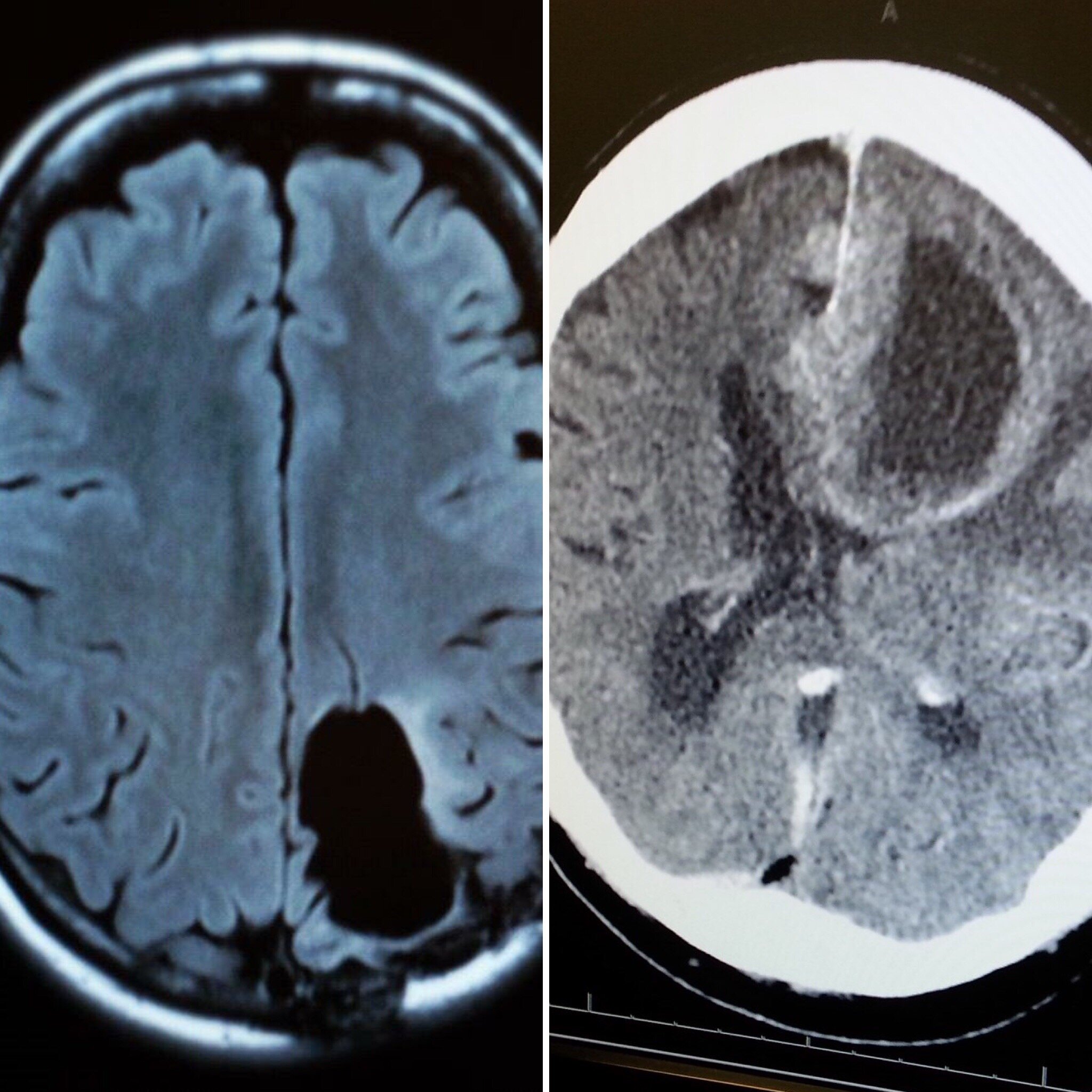The eulogy for my dad
Context: My father died from glioblastoma in June 2016. After diagnosis he declined all treatment and died within seven months. Long story short, he was a deadbeat dad and our relationship was complicated. I wrote about him and his glioblastoma diagnosis in many places, and I even did a whole ignite talk at Stanford Medicine X inspired my family's response to his disease.
My family held a memorial for him in October 2016. People flew in from around the country to be there, many of whom hadn't seen him in years--people he had cut out of his life decades prior. Needless to say, no one had planned a big speech in his honor.
The night before his memorial I felt inspired to write a little something about my relationship with him. I tearfully scribbled my thoughts. Below is what I shared at his memorial.
My brain, my dad's brain in 2016
I know we are all family here, or all cousins, as the youngest among us have been saying the last few days. But some of you may not be aware of my relationship with my dad.
My parents separated when I was year and a half old—and divorced when I was two. He was not around much in my life, and through stories and my own personal experience, I know he was a difficult man.
But no matter how much he was, or was not, a part of my daily life—I do not doubt that he loved me.
From my earliest memories through my last, he would say to me, “Is that you?” I think he would say this to my brother and sister too, but I always thought it was special—just for me.
“Is that you?”
I remember rare visits when I was little. The toys he had at his apartment for me included crayons, coloring books, and a chess set. I think I played my first game of chess around age five. He never let me win. I still haven’t beat him. And I never will.
He moved around a lot. I gave him a picture I drew of a bird when I was eight years old. I remember seeing him when I was 15 and that picture was framed, hanging on the wall—one of the only pieces of art in his apartment.
He told me once he had alarms programmed into his watch. 2:08 p.m. 4:24 p.m. 7:18 p.m. These seemingly arbitrary times corresponded with dates in the calendar that were important to him. February 8. April 24. July 18. The dates his three children were born.
I do not doubt that my dad loved me. That he loved us. I just think he did not know how to love. How to express love in a healthy way. When I look at him in this context, I feel sorry for all of us. He never got to really know me. I never got to really know who he was beyond the superficial scheming and dealing he presented on the surface.
If you knew my dad, you knew he had a passion for learning. He wanted to be the smartest, craftiest person in the room. In his last few years he became obsessed with Ray Kurzweil, an author, computer scientist, inventor and futurist. My dad was impressed with Kurzweil and believed him to be the smartest man in the room. I think it fitting to share this quote with you from Ray Kurzweil about death.
“Death gives meaning to our lives. It gives importance and value to time. Time would become meaningless if there were too much of it.”
My dad also loved the book Jonathan Livingston Seagull, a book about a seagull learning about life and flight. When I was 24 my dad asked me to design him a business card. On the back he asked me to add a quote from the book: “The gull sees farthest who flies highest.” The design of the card included a seagull, and looked similar to the decoration on his urn.
I want to share with you another quote from Jonathan Livingston Seagull:
“We choose our next world through what we learn in this one. Learn nothing and the next world is the same as this one, all the same limitations and lead weights to overcome.”
This world was not easy for my dad. Our lives have not been easy, my life has not been easy, with my dad.
But if we can choose our next world based on what we learned in this one—my dad truly learned many lessons. He filled his mind with knowledge. He struggled with love and emotion. I believe, at the end, he learned from this world—and my wish is that he entered the next world unencumbered with these limitations.
If there is a next life, or after life… I hope to run into him again. And when I do, I’ll ask, “Is that you?”
